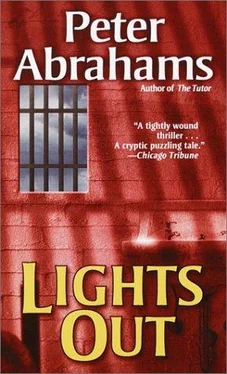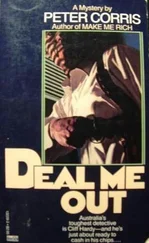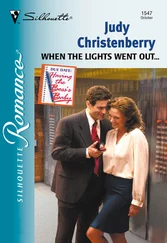Peter Abrahams - Lights Out
Здесь есть возможность читать онлайн «Peter Abrahams - Lights Out» весь текст электронной книги совершенно бесплатно (целиком полную версию без сокращений). В некоторых случаях можно слушать аудио, скачать через торрент в формате fb2 и присутствует краткое содержание. Год выпуска: 2002, ISBN: 2002, Издательство: Fawcett Books, Жанр: Триллер, на английском языке. Описание произведения, (предисловие) а так же отзывы посетителей доступны на портале библиотеки ЛибКат.
- Название:Lights Out
- Автор:
- Издательство:Fawcett Books
- Жанр:
- Год:2002
- ISBN:978-0345445780
- Рейтинг книги:4 / 5. Голосов: 1
-
Избранное:Добавить в избранное
- Отзывы:
-
Ваша оценка:
- 80
- 1
- 2
- 3
- 4
- 5
Lights Out: краткое содержание, описание и аннотация
Предлагаем к чтению аннотацию, описание, краткое содержание или предисловие (зависит от того, что написал сам автор книги «Lights Out»). Если вы не нашли необходимую информацию о книге — напишите в комментариях, мы постараемся отыскать её.
Lights Out — читать онлайн бесплатно полную книгу (весь текст) целиком
Ниже представлен текст книги, разбитый по страницам. Система сохранения места последней прочитанной страницы, позволяет с удобством читать онлайн бесплатно книгу «Lights Out», без необходимости каждый раз заново искать на чём Вы остановились. Поставьте закладку, и сможете в любой момент перейти на страницу, на которой закончили чтение.
Интервал:
Закладка:
“What are they?”
“The first, less supported by the text, is the Everest explanation.”
“Because it was there?”
“Check. And the second, which fits much better, is the apple-and-Eve explanation.”
“Meaning?”
“Original sin.”
Eddie didn’t like that one. He preferred some of his own devising-such as the Mariner was afraid of sailing fast, or jealous that the bird could fly.
“Doesn’t grab, huh?” said Karen.
“No.”
“I didn’t believe in original sin either for the longest time. My work has convinced me otherwise.”
What had Jack said? She managed family money. “You’re an investor?”
“Right.”
Eddie didn’t see how that would give her special insight into original sin, and she offered no elaboration.
“I’m going to melt,” Karen said. She stood up, leaving a sweaty imprint of her sex on the bench. “And I’ve got to give your brother a call, as a matter of fact.”
Eddie rose too. “He’s out of town.”
Her voice grew sharper. “Where?” She hitched up her towel.
Eddie paused. They were very close. The heat, the nearness of their almost-naked bodies: what would happen if he just put his arms around her? He had no idea. He looked down into her eyes. There was something odd about them, but he couldn’t place it.
“I can’t believe he didn’t tell me,” Karen said, backing away. Suddenly she was angry. “That’s so sloppy of him. He knew this was rollover day. We discussed it last night. This is going to cost-him and us.”
Eddie didn’t know what rollover day meant, or how missing it would cost anyone. But it all sounded probable. “He’s gone to Grand Cayman. I don’t know where he’s staying.”
“Thank Christ,” Karen said. “I know where he stays. You just saved him a bundle. And me.”
Eddie was pleased, and more pleased when she smiled and said: “Now I owe you one.”
“You don’t.”
“I do. And I’m free for dinner tonight.”
“Me too.”
She laughed. He felt her breath on his face, cool in the atmosphere of the steam bath. “Pick you up at six,” she said. “Dress casual.”
And then she was out the door, trailing steam. For a moment Eddie was breathless, and not just because of the heat.
It wasn’t until later, in the shower, that he realized what had been odd about Karen’s eyes: he’d seen the circular outlines of transparent discs floating on her cool blue irises. How could she be blind as a bat when she was wearing contact lenses?
18
Dress casual: what did it mean?
Eddie wandered around Macy’s, checking out the clothes and lots of other things, even trying on a blue blazer in front of a three-way mirror. He noticed stubble on his head. He hadn’t shaved it for a while, no longer had his Remington, of course; that was one of the gifts he’d left for Prof. The stubble had a tarnished sheen. Eddie stepped closer to the mirror, and saw that his hair was growing in gray.
“Fabulous,” said the clerk. “It fits you like a glove.”
Eddie left Macy’s without buying the blazer or anything else, and returned to Jack’s suite at the Palazzo. Jack would know how to dress casual. In the bedroom, he opened drawers full of stuff, better than anything he’d seen at Macy’s. There were all kinds of colors and textures. Eddie had worn denim so long he’d forgotten what matched what. He began putting on and taking off clothes, reminded of a scene in a book about Marie Antoinette.
Some time later he was standing in front of the mirror again, wearing a black cotton turtleneck, a blue wool sweater, gray corduroy pants rolled up an inch or two and held in place by a tightly cinched woven-leather belt, gleaming loafers with tassels on them.
He studied his reflection. A clever trick, like the photographic blending of ruffian’s head on Ivy Leaguer’s body. Fabulous. Fit like a glove, but someone else’s. He stuck his hands in the pockets, trying for casual, and withdrew a half-full pack of Camels. He came close to lighting one, came close to throwing the pack away, ended by putting it back in his pocket.
At six o’clock the phone buzzed. “I’m downstairs,” said Karen de Vere.
Karen did look fabulous: her hair was swept up, revealing the substructure of her face, at once strong and fine. She wore jeans, leather boots, a leather jacket; and her tortoise-shell glasses. She offered her hand. He shook it: warm, dry, not without power.
“You look so much like your brother,” she said, “except for the hair. But I guess everyone tells you that.”
“We don’t hang out with the same people,” Eddie replied.
Karen almost laughed; but how could she have gotten the joke? Eddie saw the laugh coming in her eyes; then she stifled it.
“Did you get in touch with him?” Eddie asked.
“Everything’s fine.”
Karen had a car outside, a low Japanese two-seater. “Not too hungry, I hope,” she said. “It takes about an hour.”
“Fine.”
They drove out of Manhattan, onto a bridge, headed north. She stuck a cassette into the tape player. “Like jazz?” she said. “I’m sick of rock.”
A bass played a bouncy line that made Eddie think of hippos, then came a trumpet, soaring above. “Me too.” He’d heard nothing but rock blasting out of the cell blocks for fifteen years.
Karen drove fast, cutting from lane to lane. She watched the road ahead. From time to time, he watched her. The clouds darkened and darkened, and then it was night.
“Funny thing,” she said, as they crossed the Connecticut line. “I’ve known Jack a number of years. Business, but we’ve had lunch a few times, went to a hockey game once, if I recall.”
“You like hockey?”
“Just the fighting,” said Karen. “The point is, in all the time I’ve know him, he never mentioned you.”
“I’m the black sheep.”
“How so?”
“You know how families are,” Eddie said, although his own didn’t deserve the name.
“I know how mine is-completely screwed up,” Karen said. She glanced at him; oncoming headlights glared on the lenses of her glasses. “What makes you the black sheep?”
Eddie shrugged.
“Jack did make an animal analogy last night about you, now that I think of it, although it was to a bird, not a sheep.”
Eddie waited.
“The albatross, specifically. Odd, given our earlier conversation about ‘The Mariner.’ ”
An icy wave flowed across Eddie’s shoulders and down his spine. He hadn’t felt anything like it since the moment in the shower room when he’d come to and realized what Louie and the Ozark brothers had done. Icy: because Jack considered him an albatross; because Jack would tell someone; because of what it said about his own obsession-yes-with the poem.
Karen was looking at him again. This time there was no headlight glare, and her eyes were nothing but black sockets. The trumpeter began something that sounded like “Where or When” and quickly lost its wistfulness. Karen said: “Sometimes there are coincidences that don’t mean anything-like when you’re reading a word and someone says it on the radio at the same time. But some coincidences mean a lot.”
“Do they?” Eddie said.
“If you believe that things go on under the surface.”
“I wouldn’t know,” Eddie said. “I don’t believe you.”
“Why not?”
“Because you’re smart, and you know something about life. Anyone can see that.”
“Not Floyd K. Messer,” said Eddie.
“Who’s he?”
“An old colleague.”
“In what business was that?”
“Warehousing.”
Karen turned off at an exit, drove through a prosperous town and onto a country road. The headlights picked out details in the darkness: the white fence of a stable, reflective tape on the heels of a jogger’s shoes, a sign that read “Antiques” in Gothic letters, to prove how old they were.
Читать дальшеИнтервал:
Закладка:
Похожие книги на «Lights Out»
Представляем Вашему вниманию похожие книги на «Lights Out» списком для выбора. Мы отобрали схожую по названию и смыслу литературу в надежде предоставить читателям больше вариантов отыскать новые, интересные, ещё непрочитанные произведения.
Обсуждение, отзывы о книге «Lights Out» и просто собственные мнения читателей. Оставьте ваши комментарии, напишите, что Вы думаете о произведении, его смысле или главных героях. Укажите что конкретно понравилось, а что нет, и почему Вы так считаете.












